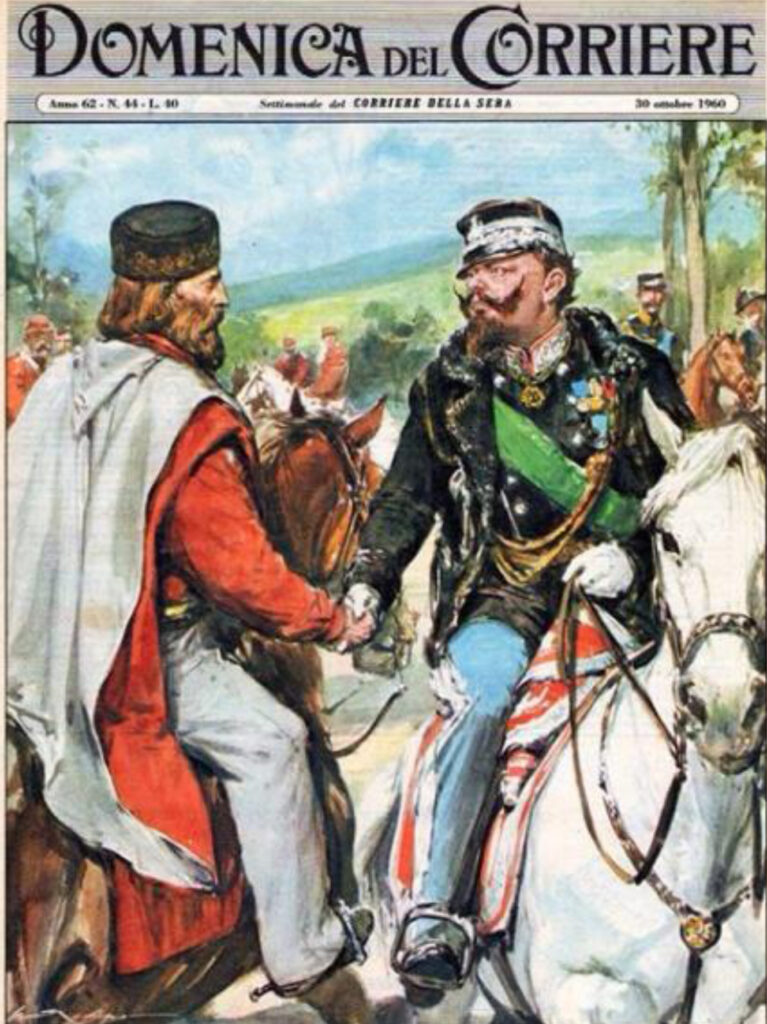In 1864, during his invasion of the Confederate South, General Sherman famously wrote to President Abraham Lincoln: “I beg to present you as a Christmas gift the city of Savannah …”

Whether Sherman knew it or not he was mimicking a similar gesture performed four years earlier and halfway around the world. On October 26, 1860, Giuseppe Garibaldi presented the cities of Naples and Palermo, as well as eight regions of the Bourbon kingdom to Victor Emmanuel’s Royal House of Savoy with a handshake and the words: “King of Italy!”
As gestures go, this was as grand and as selfless as any in history. A bearded soldier of fortune with a thousand volunteers had conquered the Kingdom of the Two Sicilies in five months, then turned it over to someone else. Of course there is more to the story. Garibaldi wasn’t working alone. He was egged on and later joined by Sicilian revolutionary in exile Rosolino Pilo. The House of Savoy was unofficially supplying Garibaldi with men and arms, and even the British Navy had his back as he sailed into Bourbon waters.
But let us not minimize the spearhead of this operation, Garibaldi himself. A man whose career began at sea evolved into one of a land-based soldier fighting for social justice on two continents – Europe and South America. His politics straddled both the Left and the Right. Fascism later claimed him as a patriotic warrior in the Roman mold. The Left still sees him as an anti-cleric and hero of the oppressed. He was all of them. But his greatest passion was to restore Roman Italy. “The Rome that I beheld with the eyes of my youthful imagination was the Rome of the future…the dominant thought and inspiration of my whole life.” Restoring Roman Italy was his destiny and the true meaning of the Risorgimento (“Resurrection” or “Resurgence”).
The Savoys couldn’t control Garibaldi for long after that October handshake. The intrepid warrior now had his sights on the Papal States – the central Italian regions of Lazio, Umbria, Marche and Emilia-Romagna. But just before he launched his new invasion, the Savoys sent a force to block him. The King could not risk a war with the Pope and his defender France. When the two Italian forces met, Garibaldi was wounded in the foot by a stray bullet. A truce was declared; Garibaldi left the field.
In later years he saw the unintended effects of his reunification of Italy. That handshake unleashed decades of instability in the South. Depending on who writes the history, the North destroyed a thriving Bourbon kingdom to feed its own treasury and fund colonial dreams in Africa. In contrast, the Bourbons had maintained a feudal society that built only churches and palaces but no schools, leaving the South with only clergy, aristocrats, and ignorant peasants.
What southerners considered ‘guerrillas’ resisting the Savoy occupation, northerners considered ‘banditti’ undermining reunification. Like our own South after the Civil War, ‘Reconstruction’ was just another term for ‘foreign’ occupation. “The outrages and injustices perpetrated against the southern people are immense and immeasurable,” Garibaldi reportedly said. Still, he considered himself innocent of subsequent policies.
Another unforeseen result of reunification was the loss of Garibaldi’s hometown of Nizza, along the Riviera. In a deal the Savoys made with France in 1860, just before Garibaldi set out on his Sicilian expedition, the Savoys agreed to trade that city (now Nice) for a military alliance against Austria in order to restore the Lombardy region to Italy. Garibaldi was a master horseman but little appreciated the horse-trading necessary to recreate Italy.
It was all too much for him and he went into self-imposed exile in Sardinia. Even that wasn’t for long. In 1870, at age 67 he answered the bugle call, this time to defend France. Newly minted General Garibaldi took command of a multi-national army of volunteers in southern France as the Franco-Prussian War entered its final stages. He and his sons managed to score against the German invaders until Paris fell days later.
One positive outcome from that war was that France could no longer protect the Pope. On September 20, 1870, Italian troops entered Rome and the Papal States were no more. Roman Italy was reborn.
And it all started with a handshake. -JLM

History never acts in a vacuum as this post notes….Had France won the Franco-Prussian war….France may have resisted the unification of Italy…The unification then started the great Immigration from the south to the Americas…..I came across a book called La Paura di Veribicaro. And talked about drat riots in the south as the newly unified Italy started drafting southern Italians to fight and develop their new colonial empire…Interesting too the names noted on the drat riot trials listed in the book are “who’s who” among San Francisco’s Calabrese community! And of course, a lot of our families never mentioned those drat riots…just part of the time, and one of many reasons to get the hell out of Dodge
Imagine how many immigrants from around the world came here just to avoid the draft in Europe and elsewhere. I’m sure many in my family came at draft age figuring they would avoid dying in Europe’s domestic and colonial wars, only to be drafted in WW I. I lost a grest uncle who was only here 5 years until they made him a doughboy and cannon fodder on the Western Front. He might have survived in the Italian Army, who knows?